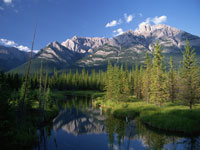Visit worldtravels.com for the full guide to Canada. Build a complete Canada travel guide and email to your clients - sign up for a trial subscription of World Travels Pro.
Canada

The vast nation of Canada, second largest country in the world, offers a range of experiences for visitors that are as wide as the land itself. From its large cosmopolitan cities to its frozen northern tundra; its snowy mountain peaks to its rugged coastlines; and its rich farmlands to its pioneering outposts, Canada offers something to suit the taste of every traveller. Canada is bound in the west by the Pacific Ocean and Alaska, to the east by the Atlantic Ocean, to the north by the polar ice cap, and in the south by the United States of America.
It is a country renowned for its stunningly beautiful scenery and love of the outdoors. Even the cities have been carefully designed to preserve metropolitan green belts and parklands, ensuring that Canadians are never far from their natural heritage. The country has a French and British colonial heritage, which is reflected in its cuisine, culture and customs, mixed in with the legacy of the country's own enigmatic aboriginal First Nations history.
In the south the Rocky Mountains intrude into Canada across the border with the United States, separating Canada's two main tourist provinces, British Columbia and Alberta. The mountains abound with winter sports resorts. Throughout the nation the most popular venues for outdoor pursuits, year round, are the country's huge national parks. There are more than 41 of these, one of them, Wood Buffalo National Park in Alberta, being larger than the country of Switzerland. Canadian national parks are unique in that they have cities and towns inside the protected areas, which provide comfortable bases for exploring the natural and manmade attractions of the reserves.
Climate
Being such a large country, Canada's climate varies depending on which area one visits. It also has very distinct seasons. The warmest months are July and August, and in winter (December, January and February) it is very cold with heavy snowfalls in most provinces. Autumn is a beautiful season with crisp air and brilliant fall foliage, while in some areas spring brings the emergence of carpets of wild flowers.
Money
The currency used is the Canadian Dollar (CAD), which is divided into 100 cents. One-dollar coins are also known as loonies (due to the picture of a loon, a type of bird, on the coin), and two-dollar coins as toonies. Banks and bureaux de change will change money and travellers cheques, as will some hotels, but the rate will not be as good. Major credit cards are widely accepted and ATMs are plentiful. US Dollars are largely accepted, though due to fraud, larger notes might not be and change is usually given in Canadian dollars.
Passport Visa
All visitors must hold a valid passport. Visitors are recommended to hold onward or return tickets, all documents needed for the next destination and sufficient funds to cover the period of intended stay. As part of the Western Hemisphere Travel Initiative (WHTI), all travellers travelling between the United States and Canada, Mexico, Bermuda, and the Caribbean region are required to present a passport or other valid travel document to enter or re-enter the United States. If departing from the USA a valid passport will be required by immigration authorities.
Entry Requirements
- US travellers should have a valid passport if departing from the USA, otherwise a government-issued photo ID, such as a driver's license, as well as proof of citizenship, such as a birth certificate, is recommended or a Western Hemisphere Travel Initiative (WHTI) compliant document. A visa is not required for a stay of up to six months. *Note: if departing from the US, a valid passport is required by US immigration authorities.
- UK nationals must have a passport valid for the period of intended stay. A visa is not required for a stay of up to six months for passports endorsed British Citizen, British Citizen (Overseas), British Overseas Territories Citizen and British National (Overseas). Other British passport holders are advised to check on visa requirements for entry to Canada.
- Australians must hold passports valid for period of intended stay. A visa is not required for a stay of up to six months.
- South African nationals must be in possession of a passport valid for the period of intended stay. A visa is required. South African temporary passports are not recognised.
- Irish nationals must hold a passport valid for the period of intended stay. A visa is not required for stays of up to six months.
- New Zealanders require a passport valid for the period of the intended stay. No visa is necessary for stays of up to six months.
Health
No vaccinations are necessary for travel to Canada. The West Nile virus, spread by mosquitoes breeding in stagnant water, poses a threat during summer months in rural areas, so insect-repellent measures are advised for those visiting the countryside particularly in Saskatchewan, Alberta, Ontario, Manitoba, and Quebec. Rabies is a problem and can be spread by a bite from small animals such as racoons and bats. Medical care is excellent, but expensive, so medical insurance is advised.
Embassy Consulates
- Canadian Embassy, Washington DC, United States: +1 202 682 1740.
- Canadian High Commission, London, United Kingdom: +44 (0)20 7258 6600.
- Canadian High Commission, Sydney, Australia: +61 (0)2 9364-3000.
- Canadian High Commission, Pretoria, South Africa: +27 (0)12 422 3000.
- Canadian Embassy, Dublin, Ireland: +353 (0)1 234 4000.
- Canadian High Commission, Wellington, New Zealand: +64 (0)4 473 9577.
Foreign Embassies
- United States Embassy, Ottawa: +1 613 688 5335.
- British High Commission, Ottawa: +1 613 237 1530.
- Australian High Commission, Ottawa: +1 613 236 0841.
- South African High Commission, Ottawa: +1 613 744 0330.
- Irish Embassy, Ottawa: +1 613 233 6281.
- New Zealand High Commission, Ottawa: +1 613 238 5991.







